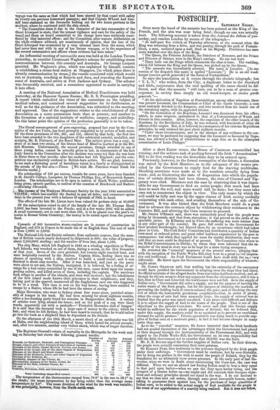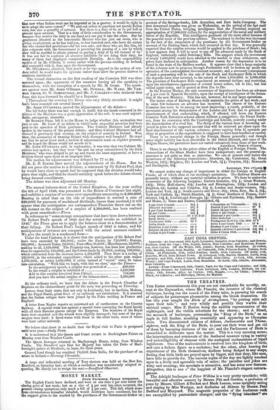After a short Easter recess, the House of Commons reassembled
last evening; and the arduous task of pushing forward the Irish " Assassination" Bill to its first reading was the immediate duty to be entered upon.
Previously, however, to the formal resumption of the debate, a discussion was raised by the Irish Members, as to the adequacy of the means pro- vided by the Government to supply food for the starving multitudes. Shocking assertions were made as to the numbers actually dying from want; and, as illustrating the state of desperation into which the popula- tion of certain districts had been thrown, the riots of Clonmel and Tip- perary were cited. Ministers met the case by observing that it was impos- sible for any Government to feed an entire people; that much had been done to meet the evil, and more would still be done; but they must take care not to counteract the object in view. The only means by which the evil could be fully met was by the upper classes of Irish society cordially cooperating with each other, and availing themselves of the aids of Go- vernment. It was also hinted that the Irish Members could do a great deal to advance the common object by withdrawing their resistance to the Coercion Bill, and allowing the Corn measure to proceed. Mr. SMITH O'Bnuts said, there was melancholy proof that the people were dying by thousands, and that from starvation: it was proved on the oaths of re- spectable juries. In Killarney and in Clare the suffering was more intense than in any other part of the country. He gave full credit to the Government for their prudent forethought; but blamed them for an occurrence which had taken place at Cork. The Cork Relief Committee had distributed a quantity. of Indian corn-meal at reduced prices, and great relief had been experienced by the poor in consequence; but when they applied for more for similar distribution, they were told that no more could be disposed of at present. The Committee then wrote to the Relief Commissioners in Dublin; by whom they were informed that the re- mainder of the meal in store was to be kept for a more trying emergency. He reviewed the "remedial" measures of the present session; alleging that with the exception of the Public Works Bill, they were to a great:er'ent inopera- tive and ineffectual. An Irish Parliament would have dealt with the Can:: very differently. He threw upon the Government the whole responsibility of whate*I.." might occur. Sir JAMES GRAHAM said, that nothing but the extremity of the emergency would have justified the Government in adopting even the steps they had taken. No official accounts of the alleged deaths from starvation bad been received ; and, al- though he did not mean to draw any argument from the circumstance, still it was a fact, that in Clare and Limerick the workhouses were not full. As to the supply of Indian corn, " Government did order a supply, not for the purpose of meeting the entire wants of the Irish people, but for the purpose of checking the markets, of preventing the holding back of corn to enhance the price, and of checking the very evil of which the honourable gentleman complained—that, in midst of plenty, when the crops of oats had been unusually large, the supply of oatmeal was so limited that the price was raised one-third. I am aware how difficult and delicate it is to adjust the supply of food to the wants of the people. That is one of the objections to the present Corn-laws. We never said that this foreign supply would be sufficient for the whole population of Ireland; but we believed that, under this supply, the markets could be so regulated as to prevent an exorbitant demand for native produce." Private speculation was doing much to provide sup- plies of Indian corn at a moderate price; in fact it had become cheaper in many parts than oats. As to the " remedial" measures, Sir James lamented that the Irish landlords had not availed themselves of the advantages which the Government had placed at their disposal through the instrumentality of the Presentment Bill; and with regard to the Public Works Bill, the Government on its own responsibility had told the Irish Government not to consider that 50,0001. was the limit.
Mr. E. B. ROCHE urged the further supplies of Indian corn. In their distress, the people were actually consuming their seed-potatoes.
Sir ROBERT PEEL bore testimony to the patience displayed by the Irish people under their sufferings. " Government must be cautions, lest by over-liberabty, lest by being too profuse in the wish to assist the people of Ireland, they lay the foundation for an ultimately more severe pressure. In the early part of last No- vember, when we were in doubt about maintaining the Corn-law, the case was different. When we saw an absurd law forcing Indian meal to bear a duty equal to that paid upon barley—when we saw the duty upon barley rising, and the prospect of a famine betbre us—we might and did conclude that finespun objec- tions and ordinary principles should not stand in the way. I do not hesitate to say that we then sent out orders, through some great mercantile houses, under- taking to guarantee them against loss, for the purchase of large quantities of Indian corn, to be added to the actual supply of food available for the people in the event of our apprehension of a scarcity being realized. But it does not follow, that now when Indian meal can be imported at Is. a quarter, it would be right in us to adopt the same course."' " We sent out orders to purchase not merely Indian corn, but also a quantitLof oatmeaL But there is a duty of 6s. or 7s. per boll at present upon oatmeal. That is a duty of little consideration to the Government, because they receive the duty in one hand and can pay it into the other. But for gentlemen situated as the honourable Member who has just sat down, who is giving employment, as he has told you, to four hundred men, who have the money but who cannot find provisions—for his own sake, and those who are like him, let him cooperate with the Government in procuring the passing of a law by which they will be enabled to obtain oatmeal on paying a duty of Is. 6d instead of 6s." It was not fair to condemn all absentee landlords for not doing their duty, for many of them had displayed commendable liberality. As to the responsibility spoken of by Mr. O'Brien, it rested rather with the persons residing in Ireland, and connected with it, than upon the Government. Mr. O'CONNELL observed, that much as he was opposed to the system of out- door relief; be would waive his opinions rather than allow the present distress to continue unrelieved.
The formal discussion on the first reading of the Coercion Bill was then entered upon; the opponents of the measure having all the speaking to themselves, with the exception of a speech by Mr. M. GORE. The speak- ers against were Mr. JOHN O'BRIEN, Mr. PowEtE, Mr. WARD, Mr. VER- NON SMITH, Sir W. SOMERVILLE, and Mr. J. COLLETT—WhO declared that from this time forward he should be a Repealer.
[Throughout the evening the House was very thinly attended: it might have been counted out several times.]
Mr. JOHN O'CoNNELL moved the adjournment of the debate—
The bill before them was bad enough in itself; but the insult conveyed in the silence of the Ministers was a great aggravation of the evil: it was most unjusti- fiable, outrageous, shamefuL
Sir ROBERT PEEL left it to the House to judge whether this accusation was just or not. He knew of no debate in which more respectful attention had been paid to the speeches of Irish gentlemen. Two Cabinet Ministers bad already spoken in the course of the present debate; and three Cabinet Ministers had ad- dressed it previously that evening, on the subject of scarcity in Ireland. Was, then, the accusation of treating Ireland with disrespect well founded? He must say that he never knew such a motion of adjournment made on slighter grounds; and he hoped the House would not accede to it.
Mr. JOHN O'CONNELL said, in explanation, it was true that two Cabinet Mi- nisters had spoken ; but they were "far and far away outnumbered by the Irish Members," who were obliged to get up and repeat the same arguments, or have a division forced upon them at an improper time.
The motion for adjournment was defeated by 77 to 20.
Mr. E. B. ROCHE then moved the adjournment of the House. But he did not press the motion to a division; a statement by Sir Robert Peel, that he would have risen to speak had he supposed that the division would take place that night, and that he should certainly speak before the debate closed, being deemed conciliatory.
The debate was then adjourned till Monday.



























 Previous page
Previous page